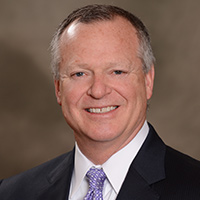Joe Fifer: Reflections on the pandemic, year 3, and its impact on healthcare’s frontline workers

If you’re like me, ringing in the New Year didn’t feel like turning the page on a new chapter as it usually does.
Amid the omicron surge of the COVID-19 pandemic, we are a long way from any semblance of normality. Collectively, we are dealing with supply chain issues that impact daily life, an employment environment that is almost unrecognizable and a volatile economy, among other issues. None of that feels “normal.”
On the other hand, the politicization of public health, which is accompanied by continual wrangling about how to mitigate (or not mitigate) the pandemic, has come to seem all too normal. To make matters worse, that wrangling is almost devoid of empathy for what our front-line healthcare workers are experiencing. Media coverage of clinical staff turnover, shortages and burnout does not begin to convey their everyday reality.
Our physicians and other clinicians are spending long hours in overfull hospitals, adapting to crisis standards of care and working side by side with
the National Guard in some cases, while battling exhaustion and burnout. They are trying to keep their heads above water and do their jobs under conditions that are anything but normal. In this environment, talk of “healthcare heroes” does not resonate with many of them. They want authenticity, not grand gestures.
In my community, schoolchildren wrote letters of appreciation to the clinical staff at a major hospital. The letters, with messages like, “Thank you for taking care of sick people,” were posted on the ICU bulletin board. A clinician who was touched by the children’s simple but authentic sentiments recounted a story that exemplifies how front-line workers are stepping up to care for sick people in these extraordinary times.
She was on duty one night as a young man lay dying of COVID-19. His parents were too distraught to be with him, having just lost two of their other adult children in rapid succession. Although none of the staff who were present shared the young man’s faith, one found the time to research an appropriate prayer online. In his final moments, the staff gathered around him, joined hands and recited the prayer.
The clinician who shared this story said this type of thing happened often. She described it as rewarding yet emotionally taxing. “It’s changing the DNA of healthcare workers,” is the way she put it.
Let’s not kid ourselves. Although the pandemic has been hard on everyone, the impact on front-line caregivers goes way beyond what the rest of us experience.
To the clinicians among HFMA’s membership: I thank you.
To our finance folks: Please express your support for front-line workers whenever you have a chance. It won’t solve everything. But the simple act of pausing, making eye contact and thanking them is a good place to start.
Oh, and get vaccinated — for many reasons, not least of all because it’s the act of respect that lends authenticity to your words of support.





